The average cost of Colorectal Cancer ( Colon Cancer ) Treatment in Spain starts from ESP 25760 (USD 28000)
| Country | Cost | Local_currency |
|---|---|---|
| Greece | USD 35000 | Greece 32200 |
| India | USD 6460 | India 537149 |
| Israel | USD 22000 | Israel 83600 |
| Lebanon | USD 30000 | Lebanon 450166500 |
| Malaysia | USD 20000 | Malaysia 94200 |
| South Korea | USD 30000 | South Korea 40280700 |
| Spain | USD 28000 | Spain 25760 |
| Switzerland | USD 30000 | Switzerland 25800 |
| Thailand | USD 20310 | Thailand 724052 |
| Tunisia | USD 30000 | Tunisia 93300 |
| Turkey | USD 8040 | Turkey 242326 |
| United Arab Emirates | USD 19110 | United Arab Emirates 70134 |
| United Kingdom | USD 17000 | United Kingdom 13430 |
Treatment cost
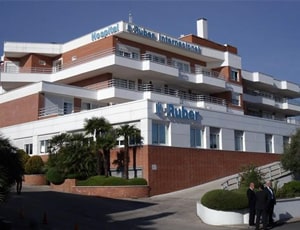
The Hospital has a wide architectural structure that consists of-

Apart from in-detail treatment procedures available, Centro Medico Teknon located in Barcelona, Spain has a wide variety of facilities available for International Patients. Some of the facilities which are provided by them are Accommodation, Airport Transfer, Choice of Meals, Interpreter, SIM, TV inside room. Also listed below are some of the most prominent infrastructural details:
With about 80,000 m 2 , it is equipped with the highest sanitary technology and offers a wide portfolio of services-

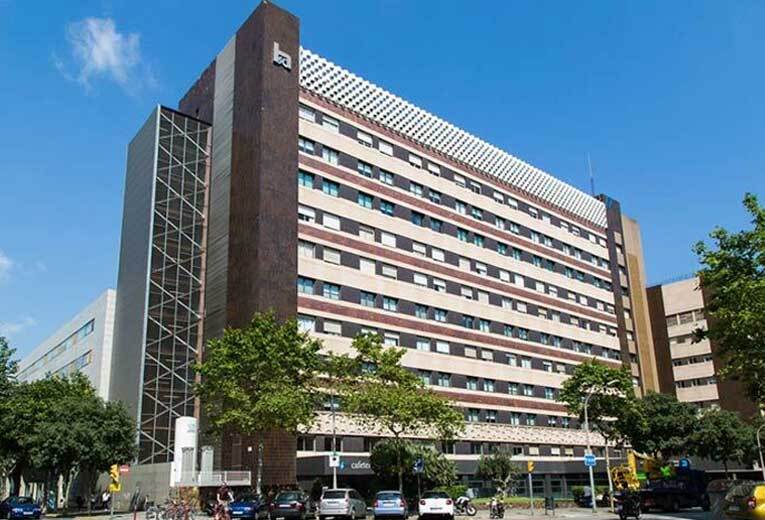
The Hospital is an amalgamation of a group of buildings located in the Eixample Left of Barcelona, ??between Paris, Viladomat, and London streets. It has a capacity of 350 adjustable beds and first-class hotel-like services inpatient rooms. Currently, it has a workforce of about 1100 Healthcare Professionals.
In order to treat patients with intensive care, the Hospital has 10 beds in its ICU for critically ill patients.
The Hospital has launched a few more things to improve customers’ services- 4 new Operating Rooms and a New Diagnostic Imaging Service.
Other Services
Types of Room
Double Rooms, Double Rooms for Individual Use, and Single Rooms; equipped with an easy-to-use electrical movement control system and a nursing call/warning system, located at the head of the bed, a sofa-bed for the companion, and a bathroom with a shower. They are also equipped with television and telephone.
A cafeteria/Restaurant is also available for the patients or visitors.
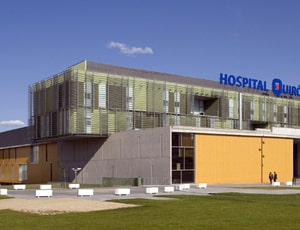
Apart from in-detail treatment procedures available, University Hospital Quironsalud Madrid located in Madrid, Spain has a wide variety of facilities available for International Patients. Some of the facilities which are provided by them are Accommodation, Airport Transfer, Choice of Meals, Interpreter, SIM, TV inside room. Also listed below are some of the most prominent infrastructural details:

Apart from in-detail treatment procedures available, Dexeus University Hospital located in Barcelona, Spain has a wide variety of facilities available for International Patients. Some of the facilities which are provided by them are Accommodation, Airport Transfer, Choice of Meals, Interpreter, SIM, TV inside room. Also listed below are some of the most prominent infrastructural details:
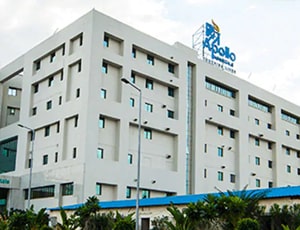
Types of Colorectal Cancer ( Colon Cancer ) Treatment in Apollo Hospital and its associated cost
| Treatment Option | Approximate Cost Range (USD) | Approximate Cost Range (INR) |
|---|---|---|
| Colorectal Cancer Treatment (Overall) | 8905 - 16529 | 732077 - 1384596 |
| Surgery | 4970 - 8806 | 412276 - 751363 |
| Chemotherapy | 915 - 2285 | 73471 - 180845 |
| Radiation Therapy | 1106 - 2838 | 92723 - 228014 |
| Targeted Therapy | 1707 - 3429 | 141057 - 271331 |
| Immunotherapy | 2211 - 4544 | 186119 - 368993 |
| Hormone Therapy | 1149 - 2822 | 93883 - 228799 |
| Colostomy | 1685 - 3982 | 140200 - 318902 |
| Ileostomy | 2300 - 4487 | 183119 - 375730 |
| Proctectomy | 2770 - 5555 | 232544 - 456239 |
| Lymph Node Removal | 910 - 2222 | 74301 - 183332 |
| Laparoscopic Surgery | 2283 - 5003 | 186433 - 417551 |
| Robotic Surgery | 2775 - 6056 | 227412 - 506681 |
| Minimally Invasive Surgery | 2797 - 6195 | 231846 - 512877 |
DOCTORS IN 13 SPECIALITIES
FACILITIES & AMENITIES
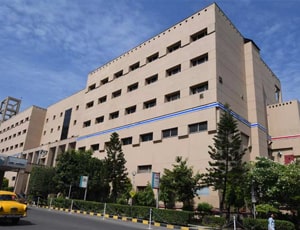
Types of Colorectal Cancer ( Colon Cancer ) Treatment in Apollo Multispecialty Hospitals and its associated cost
| Treatment Option | Approximate Cost Range (USD) | Approximate Cost Range (INR) |
|---|---|---|
| Colorectal Cancer Treatment (Overall) | 8874 - 17024 | 748129 - 1356529 |
| Surgery | 5004 - 8814 | 421454 - 748761 |
| Chemotherapy | 920 - 2242 | 74514 - 188409 |
| Radiation Therapy | 1125 - 2822 | 93337 - 229754 |
| Targeted Therapy | 1657 - 3411 | 139597 - 275688 |
| Immunotherapy | 2246 - 4592 | 188534 - 375033 |
| Hormone Therapy | 1101 - 2853 | 90520 - 226634 |
| Colostomy | 1709 - 3879 | 136044 - 325241 |
| Ileostomy | 2297 - 4500 | 186726 - 371411 |
| Proctectomy | 2766 - 5537 | 232714 - 457185 |
| Lymph Node Removal | 893 - 2234 | 73379 - 186680 |
| Laparoscopic Surgery | 2278 - 5045 | 183529 - 419825 |
| Robotic Surgery | 2751 - 6088 | 235405 - 498587 |
| Minimally Invasive Surgery | 2759 - 6156 | 227422 - 505262 |
DOCTORS IN 13 SPECIALITIES
FACILITIES & AMENITIES

Types of Colorectal Cancer ( Colon Cancer ) Treatment in Memorial Atasehir Hospital and its associated cost
| Treatment Option | Approximate Cost Range (USD) | Approximate Cost Range (TRY) |
|---|---|---|
| Colorectal Cancer Treatment (Overall) | 3301 - 13330 | 102200 - 398954 |
| Surgery | 2827 - 7719 | 85823 - 240033 |
| Chemotherapy | 907 - 2767 | 27459 - 84151 |
| Radiation Therapy | 1121 - 3367 | 34117 - 101919 |
| Targeted Therapy | 1710 - 3897 | 51668 - 120262 |
| Immunotherapy | 2222 - 4456 | 67153 - 138200 |
| Hormone Therapy | 1111 - 3434 | 34176 - 101501 |
| Colostomy | 1718 - 4543 | 50665 - 134457 |
| Ileostomy | 2204 - 5051 | 66491 - 150642 |
| Proctectomy | 2758 - 6682 | 85414 - 205389 |
| Lymph Node Removal | 881 - 2763 | 26615 - 82997 |
| Laparoscopic Surgery | 2780 - 6895 | 85327 - 200085 |
| Robotic Surgery | 3325 - 8012 | 103787 - 241734 |
| Minimally Invasive Surgery | 2756 - 6859 | 83393 - 205629 |
DOCTORS IN 13 SPECIALITIES
FACILITIES & AMENITIES
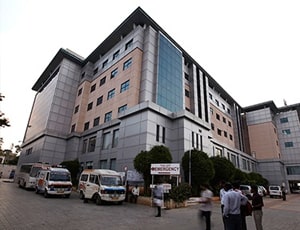
Types of Colorectal Cancer ( Colon Cancer ) Treatment in BGS Gleneagles Global Hospitals and its associated cost
| Treatment Option | Approximate Cost Range (USD) | Approximate Cost Range (INR) |
|---|---|---|
| Colorectal Cancer Treatment (Overall) | 9171 - 17033 | 748476 - 1362000 |
| Surgery | 5059 - 9127 | 411322 - 737425 |
| Chemotherapy | 890 - 2230 | 75260 - 184113 |
| Radiation Therapy | 1123 - 2769 | 93229 - 234501 |
| Targeted Therapy | 1695 - 3412 | 136419 - 278296 |
| Immunotherapy | 2261 - 4583 | 183826 - 362120 |
| Hormone Therapy | 1116 - 2753 | 92348 - 228357 |
| Colostomy | 1716 - 3947 | 136790 - 317661 |
| Ileostomy | 2244 - 4550 | 188064 - 366498 |
| Proctectomy | 2785 - 5700 | 234324 - 470443 |
| Lymph Node Removal | 891 - 2223 | 73642 - 182917 |
| Laparoscopic Surgery | 2239 - 5005 | 184414 - 409719 |
| Robotic Surgery | 2811 - 6115 | 232968 - 509934 |
| Minimally Invasive Surgery | 2812 - 6246 | 235511 - 512042 |
DOCTORS IN 14 SPECIALITIES
FACILITIES & AMENITIES
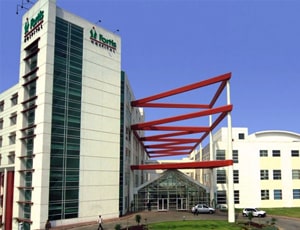
Types of Colorectal Cancer ( Colon Cancer ) Treatment in Fortis Hospital and its associated cost
| Treatment Option | Approximate Cost Range (USD) | Approximate Cost Range (INR) |
|---|---|---|
| Colorectal Cancer Treatment (Overall) | 8144 - 15259 | 667419 - 1247980 |
| Surgery | 4558 - 8151 | 374946 - 665706 |
| Chemotherapy | 814 - 2036 | 66672 - 165954 |
| Radiation Therapy | 1018 - 2527 | 82937 - 207097 |
| Targeted Therapy | 1521 - 3050 | 125282 - 249863 |
| Immunotherapy | 2026 - 4052 | 167162 - 333773 |
| Hormone Therapy | 1017 - 2538 | 83053 - 208719 |
| Colostomy | 1528 - 3552 | 124509 - 291004 |
| Ileostomy | 2030 - 4045 | 165951 - 331962 |
| Proctectomy | 2539 - 5084 | 209009 - 416084 |
| Lymph Node Removal | 811 - 2022 | 66876 - 165901 |
| Laparoscopic Surgery | 2038 - 4555 | 167104 - 374741 |
| Robotic Surgery | 2541 - 5558 | 207458 - 455885 |
| Minimally Invasive Surgery | 2534 - 5604 | 209046 - 459552 |
DOCTORS IN 12 SPECIALITIES
FACILITIES & AMENITIES

Types of Colorectal Cancer ( Colon Cancer ) Treatment in Wockhardt Hospital, Umrao and its associated cost
| Treatment Option | Approximate Cost Range (USD) | Approximate Cost Range (INR) |
|---|---|---|
| Colorectal Cancer Treatment (Overall) | 8116 - 15187 | 664798 - 1247580 |
| Surgery | 4563 - 8159 | 373469 - 665882 |
| Chemotherapy | 809 - 2025 | 66625 - 166595 |
| Radiation Therapy | 1018 - 2541 | 82926 - 208454 |
| Targeted Therapy | 1525 - 3049 | 125256 - 250330 |
| Immunotherapy | 2028 - 4044 | 165870 - 331505 |
| Hormone Therapy | 1014 - 2533 | 82836 - 207120 |
| Colostomy | 1529 - 3561 | 125376 - 291649 |
| Ileostomy | 2029 - 4048 | 166952 - 332229 |
| Proctectomy | 2542 - 5091 | 207320 - 414444 |
| Lymph Node Removal | 814 - 2022 | 66453 - 167022 |
| Laparoscopic Surgery | 2030 - 4552 | 165809 - 373526 |
| Robotic Surgery | 2539 - 5564 | 207801 - 457522 |
| Minimally Invasive Surgery | 2542 - 5593 | 207367 - 458151 |
DOCTORS IN 13 SPECIALITIES
FACILITIES & AMENITIES

Types of Colorectal Cancer ( Colon Cancer ) Treatment in Fortis La Femme, Greater Kailash II and its associated cost
| Treatment Option | Approximate Cost Range (USD) | Approximate Cost Range (INR) |
|---|---|---|
| Colorectal Cancer Treatment (Overall) | 8099 - 15269 | 663882 - 1243419 |
| Surgery | 4553 - 8114 | 374632 - 663564 |
| Chemotherapy | 815 - 2029 | 66830 - 167278 |
| Radiation Therapy | 1020 - 2526 | 83168 - 208206 |
| Targeted Therapy | 1524 - 3059 | 124904 - 250888 |
| Immunotherapy | 2028 - 4057 | 165819 - 332514 |
| Hormone Therapy | 1019 - 2533 | 82960 - 208963 |
| Colostomy | 1517 - 3540 | 125276 - 289924 |
| Ileostomy | 2025 - 4053 | 165779 - 331790 |
| Proctectomy | 2545 - 5076 | 207374 - 416607 |
| Lymph Node Removal | 814 - 2027 | 66542 - 167186 |
| Laparoscopic Surgery | 2031 - 4554 | 165882 - 375392 |
| Robotic Surgery | 2546 - 5555 | 207583 - 458579 |
| Minimally Invasive Surgery | 2545 - 5607 | 208232 - 457255 |

Types of Colorectal Cancer ( Colon Cancer ) Treatment in Indraprastha Apollo Hospital and its associated cost
| Treatment Option | Approximate Cost Range (USD) | Approximate Cost Range (INR) |
|---|---|---|
| Colorectal Cancer Treatment (Overall) | 9164 - 17178 | 741761 - 1411553 |
| Surgery | 5118 - 8998 | 408071 - 742918 |
| Chemotherapy | 920 - 2295 | 73217 - 186951 |
| Radiation Therapy | 1103 - 2756 | 91326 - 235280 |
| Targeted Therapy | 1681 - 3345 | 138705 - 277342 |
| Immunotherapy | 2246 - 4580 | 182505 - 373668 |
| Hormone Therapy | 1142 - 2860 | 91984 - 225631 |
| Colostomy | 1685 - 4020 | 135352 - 324919 |
| Ileostomy | 2213 - 4555 | 180772 - 365195 |
| Proctectomy | 2841 - 5662 | 229873 - 455438 |
| Lymph Node Removal | 911 - 2209 | 73941 - 186073 |
| Laparoscopic Surgery | 2218 - 4971 | 185846 - 406795 |
| Robotic Surgery | 2787 - 6090 | 228788 - 515047 |
| Minimally Invasive Surgery | 2847 - 6074 | 232338 - 502998 |
DOCTORS IN 14 SPECIALITIES
FACILITIES & AMENITIES

Types of Colorectal Cancer ( Colon Cancer ) Treatment in Manipal Hospital, Yeshwantpur and its associated cost
| Treatment Option | Approximate Cost Range (USD) | Approximate Cost Range (INR) |
|---|---|---|
| Colorectal Cancer Treatment (Overall) | 8870 - 17208 | 722444 - 1399354 |
| Surgery | 5005 - 8807 | 421283 - 745530 |
| Chemotherapy | 917 - 2244 | 73023 - 184532 |
| Radiation Therapy | 1112 - 2766 | 90746 - 227026 |
| Targeted Therapy | 1673 - 3320 | 137868 - 275964 |
| Immunotherapy | 2264 - 4445 | 181826 - 373621 |
| Hormone Therapy | 1125 - 2764 | 93613 - 227853 |
| Colostomy | 1722 - 3950 | 138470 - 322709 |
| Ileostomy | 2278 - 4516 | 185141 - 371576 |
| Proctectomy | 2864 - 5547 | 235712 - 464641 |
| Lymph Node Removal | 910 - 2248 | 75314 - 184672 |
| Laparoscopic Surgery | 2268 - 5128 | 184307 - 410645 |
| Robotic Surgery | 2862 - 6240 | 232175 - 498319 |
| Minimally Invasive Surgery | 2848 - 6178 | 227231 - 499996 |
Colon Cancer is the abnormal growth of the cells in the inner lining of the colon part of the large intestine also known as bowel cancer, colon cancer, or rectal cancer. This abnormal growth is called a polyp.
Colorectal cancer can affect men and women equally. However, studies have proven that men might develop it at a younger age.
There is no definite cause of colorectal cancer, but old age and certain lifestyle factors can increase colorectal cancer risk. Some of these colorectal cancer risk factors include the following:
A majority of colorectal cancers are adenocarcinoma. If you have been diagnosed with colorectal cancer, there are 95 percent chance that it is an adenocarcinoma. But there are some other types of colorectal cancer such as:
The doctor selects the most appropriate course of treatment for the patient after assessing the stage. Every patient has a customized treatment plan that is designed to best address their unique needs. The following options could be part of the treatment strategy.
Different types of surgery options can be used as per the identified stage of colorectal cancer. Surgery can be divided into two major segments: Early-stage colorectal cancer surgery and advanced-stage colorectal cancer surgery.
Early-stage colorectal cancer surgery: This is a minimally invasive form of surgery, which is typically recommended when the cancer is small and has not spread to other parts of the body. Early stage colorectal cancer surgery includes the following procedures:
This is a more invasive surgical option, recommended when cancer has grown into or through your colon. It can be of the following types:
In chemotherapy treatment, an anti-cancer drug is used to destroy the cancerous cells. It is commonly used before surgery, in an attempt to shrink a tumor before its surgical removal. It can also be given to relieve symptoms of colon cancer, in case it has spread to other parts of the body.
A certain number of chemotherapy cycles are also repeated after the surgery to kill the remaining cancer cells. This helps minimize the chances of cancer recurrence.
In this treatment, radiation beams such as X-ray or proton beams are used to kill cancer cells. It also prevents cancer cells from multiplying any further. This treatment is more commonly used for rectal cancer treatment before surgery to shrink the tumor. It can also be used after the surgery. Radiation therapy is the best treatment if cancer has penetrated through the wall of the rectum or traveled to nearby lymph nodes.
Targeted drug therapy is typically used for people with advanced colon cancer. It can be given alone or in combination with chemotherapy. Specific drugs help cancer cells commit suicide and strengthen the immune system. However, this treatment comes with limited benefits and risk of side effects.
Patients undergoing the surgery are required to stay in the hospital for at least two to three days after the surgery. You may expect yourself to be discharged from the hospital after regaining bowel function and the ability to eat without the support of an IV. Pain is controlled with the help of medications and it may take another two to three weeks at home before you can switch back to your normal routine.
If the Patient had surgery for the removal of bowel cancer, it may take a few weeks before you can return to work. In the case of laparoscopic surgery, you can return to work in about two weeks. In the case of open surgery, it may take around four to six weeks for you to return to work.
Patients must pay particular attention to eating the right food and avoid dehydration after bowel cancer surgery. Include high-protein foods in your diet and choose low-fiber foods if you have diarrhea. Additionally, eat limited amounts of green vegetables and only eat peeled fruits.
Patients who undergo chemotherapy before or after the surgery may experience a few side effects such as nausea, vomiting, fatigue, and pint pain. Make sure to drink plenty of fluids to minimize the side effects and recover quickly. Take emergency medications prescribed by the doctor, if needed.
Ask your healthcare adviser for the best multiple options and choose the one that meets your expectations
The average cost of Colorectal Cancer ( Colon Cancer ) Treatment in Spain starts from USD 28000 Many multispeciality hospitals in Spain that are JCI, OHSAS certified are approved and most sought after for treating international patients with Colorectal Cancer ( Colon Cancer ) Treatment
Colorectal Cancer ( Colon Cancer ) Treatment package cost in Spain has different inclusions and exclusions. The Colorectal Cancer ( Colon Cancer ) Treatment package cost usually includes all the expenses related to pre and post surgery expenses of the patient. Typically, the package cost of Colorectal Cancer ( Colon Cancer ) Treatment in Spain includes the expenses related to the surgeon's fee, anesthesia, hospital, meals, nursing and ICU stay. A prolonged hospital stay due to delayed recovery, new diagnosis and complications after surgery may increase the cost of Colorectal Cancer ( Colon Cancer ) Treatment in Spain.
There are many hospitals across the country that offer Colorectal Cancer ( Colon Cancer ) Treatment to international patients. Some of the most renowned hospitals for Colorectal Cancer ( Colon Cancer ) Treatment in Spain include the following:
After Colorectal Cancer ( Colon Cancer ) Treatment in Spain, the patient is supposed to stay in guest house for another 30 days. This duration of stay is recommended to complete all the necessary follow-ups and control tests to ensure that the surgery was successful.
There are certain expenses additional to the Colorectal Cancer ( Colon Cancer ) Treatment cost that the patient may have to pay for. These are the chanrges for daily meals and hotel stay outside the hospital. The per day extra expenses in Spain per person are about USD 50 per person.
Some of the cpopular cities in Spain that offer Colorectal Cancer ( Colon Cancer ) Treatment include the following:
Patients can also avail to attend a video teleconsultation with the Colorectal Cancer ( Colon Cancer ) Treatment surgeon in Spain. the following are some of the top doctors offering Colorectal Cancer ( Colon Cancer ) Treatment in Spain:
| Doctor | Cost | Schedule Your Appointment |
|---|---|---|
| Dr. Juan Carles | USD 758 | Schedule Now |
| Dr. Raimon Mirabell | USD 758 | Schedule Now |
The average duration of stay at the hospital after Colorectal Cancer ( Colon Cancer ) Treatment is about 4 days for proper care and monitoring. During the recovery, the patient is carefully monitored and control tests are performed to see that everything is okay. If required, physiotherapy sessions are also planned during recovery in hospital.
There are more than 5 hospitals that offer Colorectal Cancer ( Colon Cancer ) Treatment in Spain. These hospitals have propoer infrastructure as well as offer good quality of services when it comes to Colorectal Cancer ( Colon Cancer ) Treatment Additionally, these hospitals are known to comply with the international standards as well as local legal requirements for the treatment of patients.